Ectodermal dysplasia affects my life in different ways. For many years, I only thought about the ways that having x-linked hypohidrotic ectodermal dysplasia (XLHED) has caused my teeth to develop abnormally or my body to dehydrate easily. However, more recently I’ve also discovered that having this genetic condition has impacted me emotionally as well.
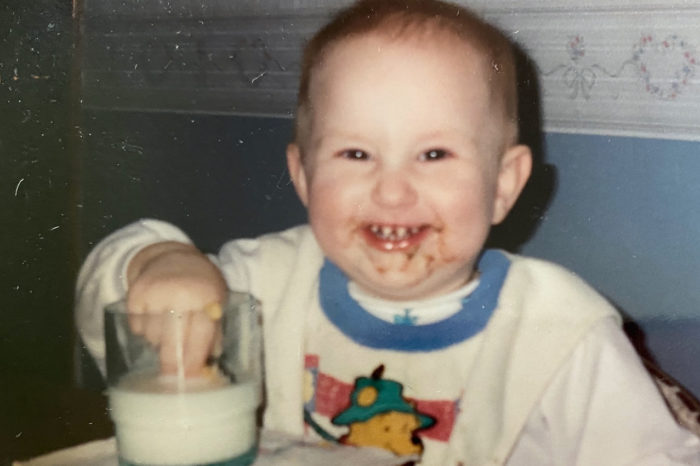
Ectodermal dysplasia affects how many teeth I have and what shape they are. 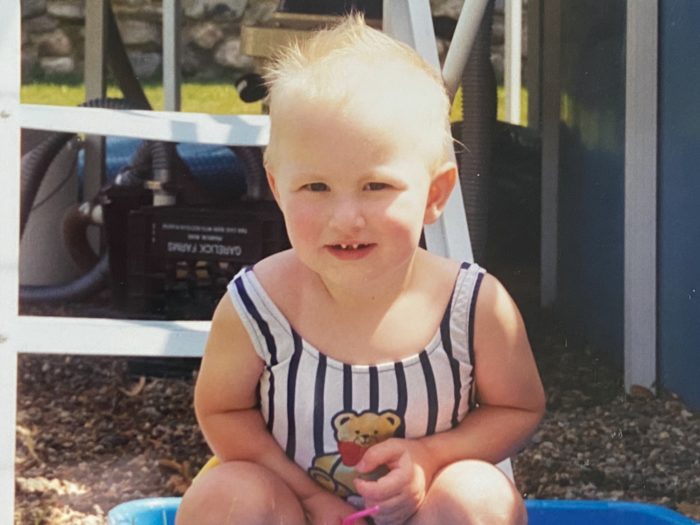
As I sat through uncomfortable dentist appointments throughout my teenage years or watched myself trying to fix my hair in the mirror before school in the morning, I was unintentionally ignoring my own emotions. As my dentist delivered disappointing news, I would try and shove any feelings of sadness deep down so that I could appear immovable, “brave”, and “strong”.
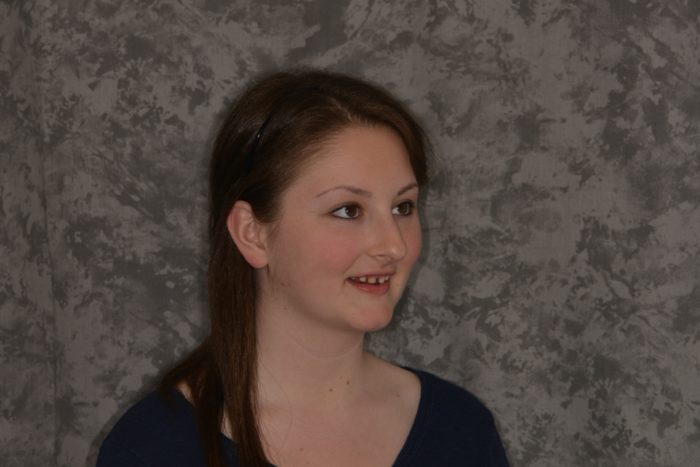
As I sat in junior year English class and felt one of my dental caps crumble on my front tooth, I did my best to mentally numb the rising panic I felt. Time and time again, I put all of my emotional effort into ignoring everything that I possibly could. I would scold myself for feeling anything and strive to be what I thought of then as “strong” by not letting anything make me cry.
Understanding My Emotions
Just about a year ago now, I sat in my therapist’s yellow office and watched as she googled an emotion wheel. She read through the different color coded sections and asked if I felt “disappointed” or “frustrated” or “relieved” about a particular topic we had been discussing and I didn’t know. I knew I felt awful.
I knew my body was tired, but I couldn’t sleep. I knew my mind was always running but I could never seem to get anywhere. I was in a constant state of frustration and irritability, but I couldn’t see it at the time.
The process of understanding my body’s feelings and building my emotional vocabulary took months to practice, but a feeling of relief was almost immediate. Then and there, in my therapist’s office I knew that we had hit the metaphorical emotional jackpot.
Years of intentional ignorance of my feelings had finally caught up with me. My body was full of bottled up frustration and disappointment and anger that my mind had worked so hard to ignore for so long.
Letting It Out
Day by day, I let my emotions out. I journaled. I talked to my therapist. I talked to my friends. I talked to my parents. I acknowledged whatever it was that I was feeling and didn’t scold myself for feeling that way. I just felt.
And as I let the weight of my experiences wash over me, I began to grieve. I grieved the person I could have been if I hadn’t been so inhibited by insecurity. I grieved the pain and the sadness that I felt throughout high school.
I grieved the times that I denied myself expression of how I had actually been feeling. I let it all out and I cried. But then, I moved on.
My body was light. My mind stopped spinning. And I actually felt grateful for everything I’d learned because of having XLHED. For the first time in my life, I genuinely felt as though I could transform my experiences into a meaningful purpose.
Finding My Place
Since learning to actually acknowledge and process my emotions, I’ve felt immensely better and found a place in the ectodermal dysplasias community. I’ve learned that being brave is not measured by how stoic you are, but by how authentically you “show up” to life and how honest you are to yourself.
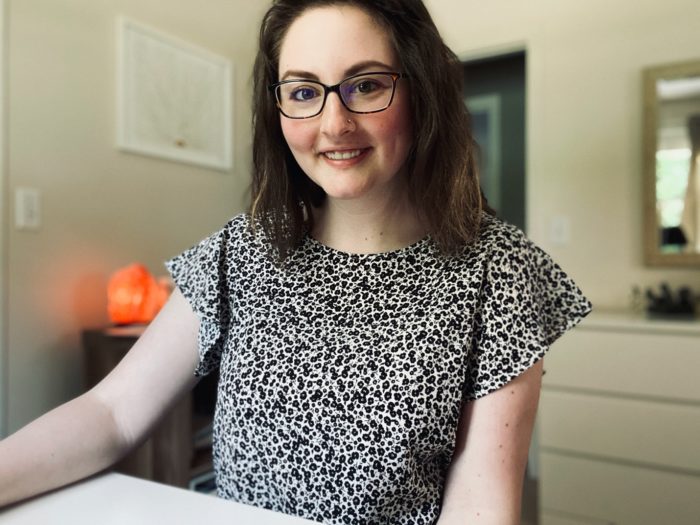
It took more courage for me to actually face my emotions rather than shove them further under the carpet and – spoiler alert – the reward is so much greater for actually acknowledging your true emotions.
It took me quite a while, but I’ve finally learned that having a condition like ectodermal dysplasia isn’t just physical, it’s deeply emotional. Every movement of every day, our body is sending us messages through how our body feels and the thoughts we think. I ask you to consider what might happen if you begin to observe those messages.
Then, once you begin to notice them, what might happen if instead of trying to sweep them under the rug you just acknowledged them. I’m willing to bet, based off my experiences and off three-quarters of a psychology degree, that labeling and acknowledging your emotions will be one of the bravest and most helpful things you do for yourself, at least it was for me.
Kaitlyn Squibb is a guest blogger for the National Foundation for Ectodermal Dysplasias. She lives in New Hampshire and will graduate in May with a bachelor’s degree in psychology. Next, she hopes to pursue a master’s degree in clinical mental health counseling. You can read more about Kaitlyn and her experience with ectodermal dysplasia on her website, Kate’s Candor.
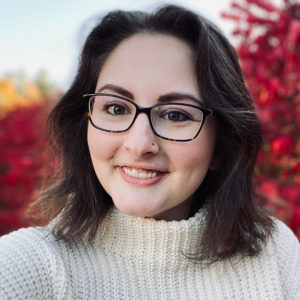
Thank you for being brave and sharing your story. We often put our mental health last. I want to raise my daughters to be their authentic selves with Ectodermal Dysplasia.
Thanks for your kind words, Sarah. It’s so true that we often try and put mental health in last place, when really it needs to become our first priority if we want the rest of our lives to fall into order. Your daughters are fortunate to have you helping them become their most genuine, authentic selves.
Thank you for writing about your story. I could relate to much of it. You are an AMAZING example!
Hi Karla! I was happy to share my story – I’m glad that you were able to relate to it and hope that you’ve been able to find space for both grief and gratitude for your experiences.
Absolutely beautiful. Thank you for sharing this.
Thanks Caitlin! I’m so grateful you found my blog post and hope you found it helpful!
Thank you for sharing your story of vulnerability, courage, and self-awareness. As a high school English teacher, I also appreciate how beautifully you’ve written about these experiences. This reminds me of the “This I Believe” essays I have my students write. The line “I grieved the person I could have been if I hadn’t been so inhibited by insecurity” is especially heartbreaking and is relevant beyond those who face something like ectodermal dysplasia in their lives. My daughter is being evaluated in March for ectodermal dysplasia. Your story and those of others shared through NFED are valuable instructional tools on how to navigate the challenges presented by ectodermal dysplasia.
Hi Keely, Thank you for leaving your comment. It’s amazing for me to hear how much you appreciated my blog post and I’m grateful for your positive feedback about my writing (especially coming from an English teacher!). It took me a while to figure out how to explain grieving the intangible aspects of having XLHED but I knew it was worth figuring out for this post. And you’re so right – I think it’s a common human experience to think about and sometimes grieve what “might have been”.
If you’re open to it, I’d love to hear about how your daughter’s evaluation goes in March – you can message me on Instagram (@Katescandor) or through my website (link above). I’m so glad that you’ve found the NFED and I’m wishing you and your family all the best.
Brilliant article! I know that emotions were huge for me growing up. I had so much anger at my ED condition, and possibly my parents for giving it to me. And as I’ve done some of the healthy activities you shared (talking to various people), I am seeing growth as I accept myself and care for myself better. This ED community is also crucial in me giving back too.
Hi, Mark. We are happy that you are a part of the NFED community!
Hi Mark, thanks for leaving your comment. I’m so glad to hear that you’ve talked to people in your life and been able to find ways to grow through your experiences. Finding ways to accept and move forward with anger, rather than letting it be a road block, requires great insight and courage.
Thank you so much for sharing! I’m so glad that you learned how to take care of your mental health – it is so important! And you are a tremendous encouragement to new moms with a child with ED, like me!
Hi Laura! I’m glad that I learned how to care for my mental health too! Prioritizing my mental health has allowed me to grow in many areas of my life and I couldn’t be more grateful for the people who supported me along the way. I’m happy to pay it forward and support others throughout their journey and I’m glad that you’re following along!
Thank you for sharing your story. I have Clouston Syndrome and at 71 I have finally accepted who I am. As a child my Dad would rub my eyebrows looking for hair, make me show family friends my nails, rough skin, and where the hair follicles were suppose to be. Never wore short sleeve shirts until I was thirteen, shorts until 15 and I have never worn anything where my toes are exposed. As a teenager felt like a freak and had only one date in high school. Who would want to go out with me. To this day I still carry those scares with me.
syndrome
Hi Frank, thank you for sharing so much of your story. I can tell these experiences were challenging for you, but I am happy to hear that you’ve been able to accept who you are. Finding self-acceptance is often difficult, even under the most ordinary circumstances, but can be especially difficult while living with a rare disorder. I’m grateful for you being so open with us here and hope that you find a strong sense of community and belonging here with the NFED. Sending much love, Kaitlyn.